Chile-Peru: Moving on from the past
- Published
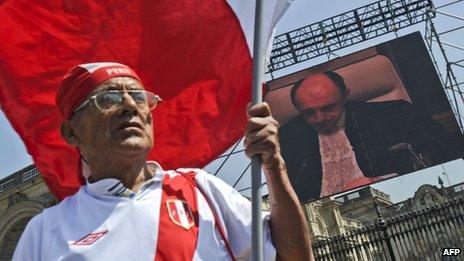
Peruvians and Chileans gathered in The Hague to watch the ruling being read
For six years, relations between Chile and Peru have been overshadowed by their dispute at the International Court of Justice (ICJ) in the Hague about their maritime border.
Now that dispute has been resolved, analysts say the two countries should be able to move on from their acrimonious past and forge closer ties.
"This could be a turning point," said Mario Artaza, professor at the University of Santiago and a former Chilean ambassador.
"Hopefully, a more mature relationship based on greater co-operation and integration can grow out of this verdict."
'Lamentable loss'
The ICJ ruling, announced on Monday, gave both countries some cause for celebration.

The court ordered Chile to relinquish control of a large swathe of the Pacific Ocean and give it to Peru, a decision described by Chile's President Sebastian Pinera as "a lamentable loss" for his nation.
But the swathe was smaller than Peru had wanted.
It had asked for 38,000 sq km (23,600 sq miles) but had to settle for around 21,000 sq km. Chile gets to keep the rest, including the lucrative fishing grounds closest to its coastline.
By changing the border, the court also gave Peru an additional 28,000 sq km of sea that until now was in international waters.
Additionally, the ICJ said the maritime border should start from the same point on the coastline as it does now. Peru had wanted it moved south, further into Chilean territory.
"It's a bitter-sweet verdict," Mr Artaza said.
Unsurprisingly, both governments made the best of the ruling.
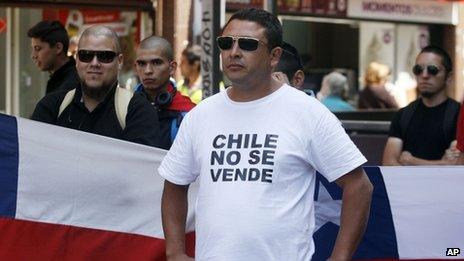
After the ruling, protesters in Santiago warned that "Chile is not for sale"
In Lima, Peruvian President Ollanta Humala said his country had won 70% of the area it had demanded while in Santiago, Mr Pinera said the court had heeded most of Chile's arguments.
Crucially, both countries said they would abide by the verdict.
Bitter history
The dispute has its roots in the War of the Pacific, which pitted Chile against a Peruvian-Bolivian Alliance in the 19th Century. Chile won the war and took land from both Peru and Bolivia.
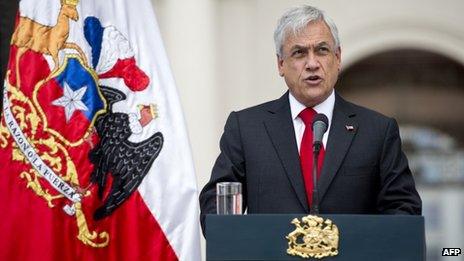
Sebastian Pinera said the ruling was "a lamentable loss for our country"
Chile and Peru signed a peace treaty in 1882 but their border was not established until 1929 and the maritime border has been a matter of contention for decades.
But despite the animosity, the two countries have shown in recent years they can work together, most notably by establishing the Pacific Alliance trade bloc, along with Colombia and Mexico, in 2012.
A Free Trade Agreement has been in place between the two countries since 2009 and trade is growing.
Peru is now the fourth biggest recipient of Chilean investment in the world, and is likely to overtake Argentina soon to become the third.
Chilean companies have $13.6bn (£8.2bn) invested in its northern neighbour, mostly in the retail and services sector. Peruvian investment in Chile is more modest but is also growing.
Some 90,000 people in Peru are employed by Chilean companies, while the expatriate Peruvian population in Chile has grown to around 150,000.
Local impact
The biggest impact of the ICJ ruling will be on Chilean fishermen in the frontier city of Arica. Although they will be still be able to fish the waters closest to the coast, they will lose access to waters further out.
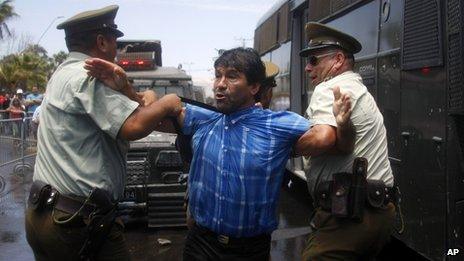
Fishermen in Arica, in Chile. took to the streets to make their displeasure known
One fishermen's association in Arica estimated that as a result, the fleet will be deprived of around 35% of its catch.
The Chilean government has promised to consider financial compensation for the fishermen.
And there are further hurdles to overcome.
The Peruvians want the border changes to be implemented as soon as possible while the Chileans say it will take time.
And some Chileans fear that having failed to gain everything they wanted, the Peruvians will continue to press further claims for Chilean land and sea.
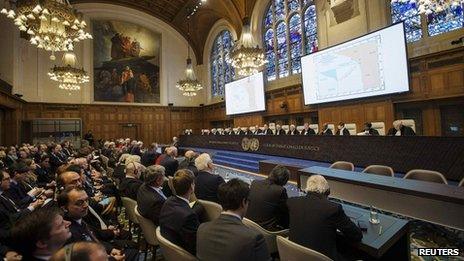
The ruling has settled the row which dates back to the War of the Pacific
"The judicial stage of this process has ended and now the political-diplomatic stage begins," said Gabriel Gaspar, an analyst at Chilean think-tank Fundacion Chile 21.
"One would like to think that from that, an agreement could be reached to ensure that Peru makes no further territorial claims against Chile."
Monday's verdict might also have implications for Chile's future relations with Bolivia, which has also taken Chile to The Hague over claims dating from the War of the Pacific.
Bolivia lodged its claim only last year and a verdict is not expected for several years.
- Published28 January 2014
- Published16 December 2013
- Published24 April 2013